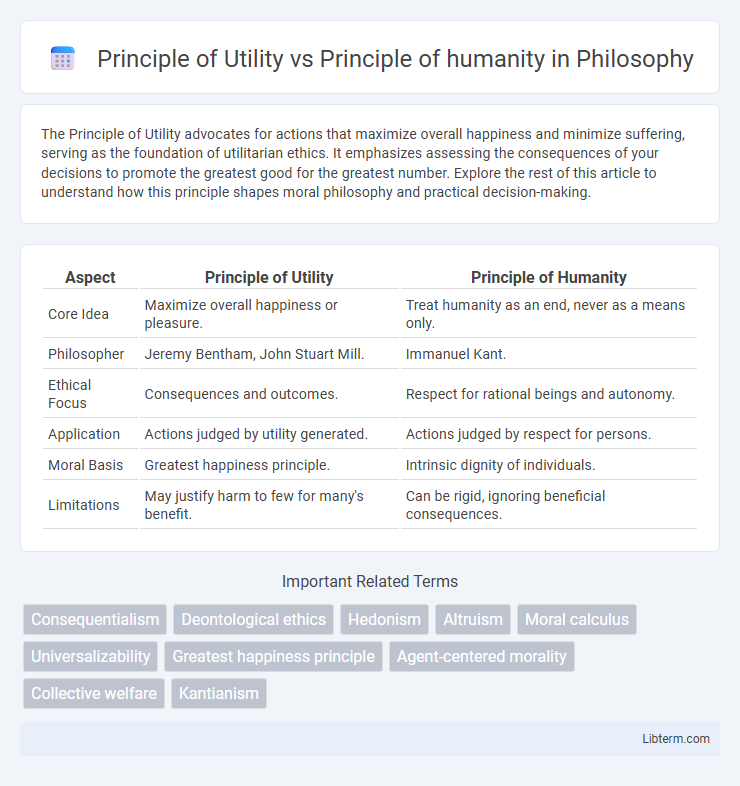The Principle of Utility advocates for actions that maximize overall happiness and minimize suffering, serving as the foundation of utilitarian ethics. It emphasizes assessing the consequences of your decisions to promote the greatest good for the greatest number. Explore the rest of this article to understand how this principle shapes moral philosophy and practical decision-making.
Table of Comparison
| Aspect | Principle of Utility | Principle of Humanity |
|---|---|---|
| Core Idea | Maximize overall happiness or pleasure. | Treat humanity as an end, never as a means only. |
| Philosopher | Jeremy Bentham, John Stuart Mill. | Immanuel Kant. |
| Ethical Focus | Consequences and outcomes. | Respect for rational beings and autonomy. |
| Application | Actions judged by utility generated. | Actions judged by respect for persons. |
| Moral Basis | Greatest happiness principle. | Intrinsic dignity of individuals. |
| Limitations | May justify harm to few for many's benefit. | Can be rigid, ignoring beneficial consequences. |
Introduction to Ethical Principles
The Principle of Utility emphasizes maximizing overall happiness and minimizing suffering, serving as a foundational concept in utilitarian ethics. The Principle of Humanity, rooted in Kantian philosophy, requires treating individuals as ends in themselves, respecting their inherent dignity and autonomy. These ethical principles often guide moral decision-making by balancing collective well-being with individual rights.
Defining the Principle of Utility
The Principle of Utility, also known as the greatest happiness principle, defines moral actions as those that maximize overall happiness or pleasure while minimizing pain and suffering for the greatest number of people. This principle serves as the foundation of utilitarian ethics, prioritizing consequences and collective well-being over individual rights. Distinct from the Principle of Humanity, which emphasizes respect for individuals as ends in themselves, the Principle of Utility assesses ethical value based on the aggregate balance of positive and negative outcomes.
Understanding the Principle of Humanity
The Principle of Humanity emphasizes treating individuals as ends in themselves, respecting their inherent dignity and moral worth, rather than merely as means to an end. It requires recognizing the subjective experiences, rights, and autonomy of persons, ensuring ethical actions uphold human dignity. This principle contrasts with the Principle of Utility, which prioritizes maximizing overall happiness or welfare, often focusing on collective outcomes over individual considerations.
Historical Origins and Philosophical Background
The Principle of Utility, rooted in utilitarianism developed by Jeremy Bentham and later refined by John Stuart Mill, emphasizes maximizing overall happiness or pleasure as the foundation of moral decisions. In contrast, the Principle of Humanity, largely derived from Immanuel Kant's deontological ethics, insists on treating individuals as ends in themselves and never merely as means to an end, emphasizing human dignity and respect. Both principles emerged during the Enlightenment era, reflecting competing approaches to ethics: consequentialist utility calculations versus duty-based respect for persons.
Core Differences Between Utility and Humanity Principles
The Principle of Utility emphasizes maximizing overall happiness or well-being by considering the greatest good for the greatest number, focusing on outcomes and aggregate benefits. The Principle of Humanity centers on respecting the intrinsic value and dignity of each individual, treating people as ends in themselves rather than means to an end. Core differences lie in Utility's consequence-driven approach versus Humanity's intrinsic moral respect for individuals regardless of overall outcomes.
Applications in Moral Decision-Making
The Principle of Utility guides moral decision-making by maximizing overall happiness and minimizing suffering for the greatest number of people. In contrast, the Principle of Humanity emphasizes respecting the intrinsic worth and dignity of each individual, ensuring decisions do not treat people merely as means to an end. Applications in ethics often balance these principles by evaluating outcomes for collective welfare while safeguarding individual rights and moral integrity.
Strengths and Criticisms of the Principle of Utility
The Principle of Utility, central to utilitarian ethics, emphasizes maximizing overall happiness and well-being, offering a clear, outcome-focused framework for moral decision-making that prioritizes the greatest good for the greatest number. Its strength lies in its practical applicability, promoting efficient resource allocation and collective welfare, but it faces criticism for potentially justifying actions that violate individual rights or ignore minority suffering. In contrast, the Principle of Humanity centers on respecting the intrinsic dignity and rights of individuals, highlighting ethical concerns about moral distribution and fairness that the Principle of Utility may overlook.
Strengths and Criticisms of the Principle of Humanity
The Principle of Humanity emphasizes treating individuals as ends in themselves, ensuring respect for human dignity and moral worth, which strengthens ethical decision-making by promoting empathy and intrinsic value. Critics argue that this principle can be overly rigid, potentially ignoring consequences and practical outcomes in favor of idealistic moral considerations. Its focus on intent and respect sometimes undermines pragmatic solution-finding, limiting flexibility in resolving complex ethical dilemmas.
Practical Examples: Utility vs Humanity in Action
The Principle of Utility prioritizes actions that maximize overall happiness, such as public health policies implementing widespread vaccinations to reduce disease and benefit the majority. In contrast, the Principle of Humanity emphasizes treating individuals with respect and dignity, illustrated by healthcare providers ensuring informed consent and personalized care regardless of statistical outcomes. Real-world ethical dilemmas often arise when maximizing collective utility conflicts with honoring individual rights and compassionate treatment.
Conclusion: Balancing Utility and Humanity in Ethics
Balancing the Principle of Utility, which prioritizes the greatest good for the greatest number, with the Principle of Humanity, emphasizing respect for individual rights and dignity, is essential in ethical decision-making. Ethical frameworks must integrate both maximizing overall welfare and safeguarding human values to avoid sacrificing minority interests for majority benefit. Achieving this balance leads to more just and compassionate outcomes in moral dilemmas and policy development.
Principle of Utility Infographic

 libterm.com
libterm.com